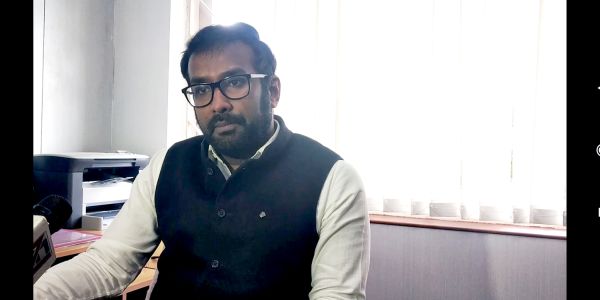Responses to digital classes ‘very good,' says Shanavas

Principal Director of School Education, Shanavas C talking to reporters in Kohima on May 5. (Morung Photo)
Morung Express News
Kohima | May 5
The COVID-19 pandemic has had an adverse affect on education worldwide with near total closure of schools, colleges and universities.
According to the UNICEF monitoring, 186 countries are currently implementing nationwide closures and 8 are implementing local closures, impacting about 98.5% of the world’s student population.
As of April 27, approximately 1.725 billion learners have been affected due to school closures worldwide.
Similarly, in response to the pandemic, the students in the state have been adversely affected particularly, the higher classes, missing out on their lessons. To mitigate this, the state Department of School Education came up with digital lesson plans through video and audio lectures.
Speaking to a section of media personnel this evening at the Secretariat, Principal Director of School Education, Shanavas C observed the initial direction of online classes and interaction through WhatsApp was very practical for private schools, with about 200 private schools conducting online classes.
However, on the flip side, students in government schools were actually missing out the classes, which prompted the department to come out with digital lessons- video and audio lectures for a period of one month.
Subsequently, the Ministry, he informed has slotted three hours time for the state education department in Doordashan while All India Radio Kohima, also slotted three hours, and broadcasting began on May 1 and 2 respectively.
The recording of audio classes began in the directorate on April 30 with five lectures of 30-25 minutes each on different subjects for class VIII, IX and XII considering the importance of these higher classes, he said.
“We have our schedule for one month, and let’s see how long this lockdown would continue because the third phase is till May 17, but we are not sure if the schools would reopen right after that, said Shanavas.
Accessibility for all
To ensure that students have access to video and audio digital classes Shanavas informed that it has written to the Ministry of Information and Broadcasting to give direction to the service providers to include Doordashan Kohima in their telecast.
For those who may not have television or radio at home, one may access the videos and audios from its official Facebook page ‘School Education Nagaland’ and YouTube page ‘DoSE Nagaland’ through mobile services, he said.
When enquired on the lack of electronic devices and poor network connectivity in the remote areas, it was informed that Deputy Commissioners of all the districts have been informed while the village councils and ward council have been requested to help the students by arranging a television set in the council hall or any available space.
At the same time, he advised that it should be arranged in such a way that social distancing protocol is maintained. This will ensure that students from their respective villages do not miss out the classes and that no student is left out towards accessing the lectures.
Shanavas also informed that it might consider classes on important subjects for the lower classes, if the lockdown goes beyond this month
On further enquiry on the response of the students, he said that the response was very good till now with about 10,000 YouTube subscribers and viewers.
“We are even getting inputs that students from outside the state are referring to our videos. It’s a good beginning. I won’t say everything is complete and it ends there. We have to keep improving and focusing that no a single student is left out in our state” said Shanavas.
Lunch fees issue
On reports that some schools were asking parents to pay lunch fees, Shanavas said the department has not received any formal complaints. However, he assured that it will address the issue. While some states have taken decisions on the fees of private schools, he maintained that the department has not come up with any concrete decisions yet.
Empathizing with the private school teachers whose salaries depend on the fee collection, he opined that considering the difficulties faced by the private schools “we can’t ask private schools to stop collecting school fees.”
“This is an unprecedented situation. Everyone is affected and everybody is suffering and we have to be compassionate” said Shanavas.






